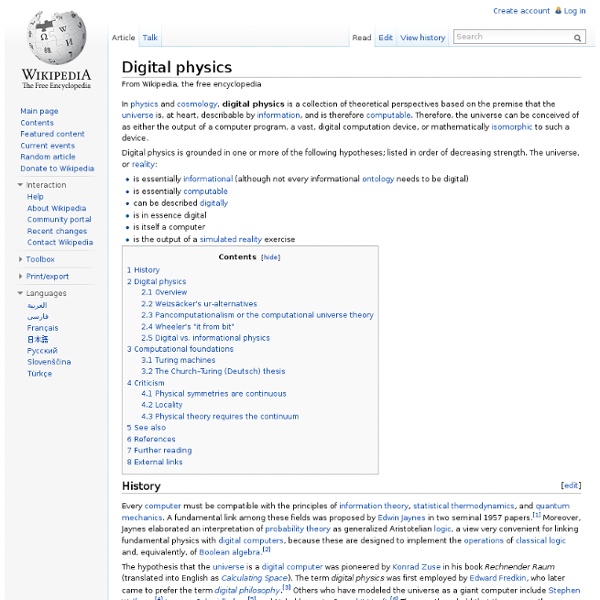Digital physics

DigitalPhilosophy.org > Home
Zuse's Thesis - Zuse hypothesis - Algorithmic Theory of Everything - Digital Physics, Rechnender Raum (Computing Space, Computing Cosmos) - Computable Universe - The Universe is a Computer - Theory of Everything
Konrad Zuse (1910-1995; pronounce: "Conrud Tsoosay") not only built the first programmable computers (1935-1941) and devised the first higher-level programming language (1945), but also was the first to suggest (in 1967) that the entire universe is being computed on a computer, possibly a cellular automaton (CA). He referred to this as "Rechnender Raum" or Computing Space or Computing Cosmos. Many years later similar ideas were also published / popularized / extended by Edward Fredkin (1980s), Jürgen Schmidhuber (1990s - see overview), and more recently Stephen Wolfram (2002) (see comments and Edwin Clark's review page ). Zuse's first paper on digital physics and CA-based universes was: Zuse is careful: on page 337 he writes that at the moment we do not have full digital models of physics, but that does not prevent him from asking right there: which would be the consequences of a total discretization of all natural laws?
Simulated reality
Simulated reality is the hypothesis that reality could be simulated—for example by computer simulation—to a degree indistinguishable from "true" reality. It could contain conscious minds which may or may not be fully aware that they are living inside a simulation. This is quite different from the current, technologically achievable concept of virtual reality. Virtual reality is easily distinguished from the experience of actuality; participants are never in doubt about the nature of what they experience. Simulated reality, by contrast, would be hard or impossible to separate from "true" reality. There has been much debate over this topic, ranging from philosophical discourse to practical applications in computing. Types of simulation[edit] Brain-computer interface[edit] Virtual people[edit] In a virtual-people simulation, every inhabitant is a native of the simulated world. Arguments[edit] Simulation argument[edit] 1. 2. 3. Relativity of reality[edit] Computationalism[edit] Dreaming[edit]
Related:
Related:



